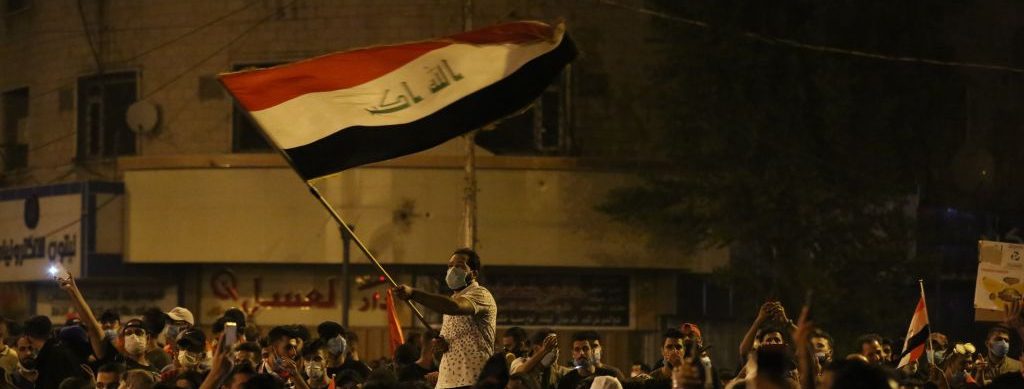[ad_1]
The Iraqi authorities must ensure truth, justice and reparations for the killing of hundreds and maiming of thousands by Iraqi security forces, Amnesty International said today ahead of the four-year anniversary of the nation-wide anti-government protests. As an immediate step, the authorities should reveal the fate and whereabouts of people forcibly disappeared during the protest movement that began in October 2019.
During the mass protests, known as the Tishreen [October] protests security forces including anti-riot police, counterterrorism forces and members of Popular Mobilization Units (PMU), a large network of militias legally considered part of the Iraqi Armed Forces, used lethal force against protesters and pursued a sinister campaign of extrajudicial killings and enforced disappearances.
“Since the Tishreen protests, successive Iraqi governments have reneged on their promises to ensure truth and justice for the state and militia violence inflicted on Iraqi protesters, activists, and lawyers and their families. The meagre number of prosecutions and investigations – which pale in comparison to the scale of the abuses – clearly demonstrate that the authorities are not interested in accountability,” said Razaw Salihy, Amnesty International’s Iraq Researcher.
“Justice for the Tishreen protests is long overdue. The Iraqi authorities must ensure independent and impartial investigations into crimes committed since 2019 against protesters, activists and their families, publish the findings and hold those suspected of criminal responsibility accountable in fair trials that meet international standards. They must also protect families demanding justice from reprisals”.
Reprisals to silence calls for justice
While some families have continued to insist on calling for accountability and pursuing investigations left dormant, reprisals for speaking out have deterred other families from continuing their pursuit of justice.
In one stark case, the father of a human rights lawyer who was forcibly disappeared in October 2019 was killed in March of 2021 after campaigning for answers about his son’s whereabouts. Amnesty International had warned of threats to the family’s safety in November 2020 and called on the Iraqi authorities to ensure their protection.
The family of Sajjad al-Iraqi, another prominent activist who was forcibly disappeared in September 2020 in Nasiriya, has also been subjected to numerous threats by people believed to be linked to the abductors and to the PMU. These individuals have on several occasions called the family or come to their home to pressure them to drop their court case related to Sajjad al-Iraqi’s disappearance. Sajjad al-Iraqi’s activism focused on corruption issues.
No meaningful accountability
Very few prosecutions of members of security forces or affiliated militias have taken place for their role in violence against protesters and activists.
The meagre number of prosecutions and investigations – which pale in comparison to the scale of the abuses – clearly demonstrate that the authorities are not interested in accountability.
Razaw Salihy, Amnesty International
In a report released in June 2022, the United Nations Assistance Mission to Iraq (UNAMI) was only able to identify the conviction of four “unidentified armed elements” since May 2021 and of six members of the security forces for targeted shootings, killings, and abductions. The report added: “UNAMI/OHCHR was unable to identify any other cases that progressed beyond the investigative stage during the reporting period.”
A family member told Amnesty International that they met with Prime Minister Mohammed Shia’ Al Sudani nine months ago and that he promised to follow up on Sajjad al-Iraqi’s case. On 22 March 2023, the Thi Qar Criminal Court convicted two individuals in absentia for kidnapping Sajjad al-Iraqi.
However, Sajjad al-Iraqi’s whereabouts remain unknown, and no arrests have yet been made in his case. A relative told Amnesty International: “There is no interest in Sajjad’s case. It is just false promises and reassurances. It is just ink on paper.”
Lack of transparency
Since 2019, successive Iraqi governments have formed numerous committees to investigate violations committed in the context of the protests at the national and governorate level, but these committees have failed to deliver on truth or justice.
The most notable was the ‘Fact-Finding Committee’, established by Executive Order 293 issued by then-Prime Minister Mustafa al-Kadhimi on 18 October 2020 with the goal of gathering evidence, publishing a comprehensive report, and identifying those responsible for the crimes committed. Under the decree, the Committee has the right to refer cases to the judiciary, however there has been no transparency as to whether this has occurred.
In a letter from Prime Minister Shia al-Sudani’s Office to Amnesty International on 2 April 2023, the Office said that “the Prime Minister ordered in November 2022 the activation of the work of the [Fact-Finding] committee and outreach to representatives from the demonstrators”. The Prime Minister’s Office outlined measures the Fact-Finding Committee had taken, including having looked into “more than 215 cases obtained from the Rusafa Central Investigative Court and reviewed more than 5,375 official documents that included medical reports, victim autopsy forms and reports of forensic experts, and the committee continues to examine documents received from courts of appeal”.
The Prime Minister’s Office also confirmed that reparations had been paid to the families of those killed, amounting to ten million Iraqi dinars for each victim.
However, reparations are not a substitute for establishing the truth or bringing perpetrators to justice, and nearly three years after it was first formed, the Fact-Finding Committee has yet to publish any findings.
Enforced disappearance is currently not a crime under Iraqi law and therefore cannot be prosecuted as a distinct offence. On 6 August 2023, the Iraqi Council of Ministers a draft “Missing Persons Law” and sent it to Parliament. The draft’s stated aim is to help relatives of the missing learn their fate and be given access to reparations, including by setting up a national commission for the missing. Yet, this draft law does not criminalize enforced disappearance or outline penalties for perpetrators.
[ad_2]
Source link
Author Profile
Latest Entries
 SportsSeptember 30, 2023Nevin seeks to build on her promise with Leicester City – FTBL | The home of football in Australia – The Women’s Game
SportsSeptember 30, 2023Nevin seeks to build on her promise with Leicester City – FTBL | The home of football in Australia – The Women’s Game Women's RightsSeptember 30, 2023Experts back decriminalization as the best means to enhance sex workers’ rights
Women's RightsSeptember 30, 2023Experts back decriminalization as the best means to enhance sex workers’ rights  World NewsSeptember 30, 2023What risks do China’s shadow banks pose to the economy? | Business and Economy
World NewsSeptember 30, 2023What risks do China’s shadow banks pose to the economy? | Business and Economy LifestyleSeptember 30, 2023Costco has begun selling gold bars
LifestyleSeptember 30, 2023Costco has begun selling gold bars



.jpeg)


